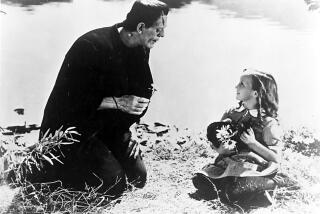BOOK REVIEW / FICTION : The Psychic Wound of the Child Becomes the Scar Marking the Man : BODO: Infant of the Aftermath, <i> by John Bennett</i> ; The Smith; $14.95, 185 pages
- Share via
Western civilization died at Auschwitz--so contends Art Spiegelman, author of the “Maus” graphic novels. We refuse to acknowledge its death, having nothing to replace it, so it stumbles onward out of sheer inertia.
John Bennett tells much the same story on an individual level in “Bodo,” a dark yet engaging fable about a boy so badly wounded, physically and spiritually, at the beginning of his life that the rest is hardly life at all.
As World War II ends in Germany, 4-year-old Bodo watches as drunken Russian soldiers rape and kill his mother and grandmother. Trying to protect his little sister, he is sodomized, whipped and thrown out into the snow.
Rescued by retreating Germans and left after the surrender at a “clubhouse” run by U.S. troops in Munich, the child is mute, his mind a jumble of terrifying impressions “that had no name.”
An older boy exposed to such savagery, like the hero of Jerzy Kosinski’s “The Painted Bird,” might react by becoming savage himself, but Bodo is too young to understand his experience and too traumatized to remember it. His wound is covered over by psychic scar tissue but never healed.
Bennett, whose output has included fiction (“Flying to Cambodia,” “The Adventures of Achilles Jones”), essays (“The New World Order”), poetry (“Crazy Girl on the Bus”), journals and travel writing, brings to this novel a hard, clean style, knowledge of history, a satirical edge and unusual tact.
The opening chapters are especially moving. Bennett, to a remarkable degree, puts us inside Bodo’s mind. He needs goodness as radical as the evil he has known, but all he gets is the mix of concern and indifference that the rest of us get--and in his case, it’s not enough.
A streetwise sergeant named Jansen, using “deeper instincts than had ever been called into play in him before,” persuades Bodo to speak but is soon arrested for black-market activity. A German nurse in an orphanage wins Bodo’s trust, but at the cost of his forgetting Jansen. “This guilt prevented him from loving [her].”
Walter Steiner, a radio engineer from Texas turned occupation official, and his German wife, Alma, formerly a secretary in Hitler’s propaganda ministry, adopt Bodo and take him to the United States. The lesser terrors of their own lives, however, have stunted them emotionally, leaving them incapable of giving Bodo more than Schwinn bikes and clean pajamas.
Bodo grows up just a little too weird. He tries everything--being a Boy Scout, a gas station attendant, a singing waiter and (his true ambition) a radio disc jockey called Beau Bodo. He makes the 1960s scene in New Orleans and San Francisco. More than once, he finds friendship and romance. But the wound has hollowed him out inside; it takes only a pinprick to break him.
In California, in the sour, druggy aftermath of the Summer of Love--”the greatest dream America had ever had”--the breakage accelerates. Bodo loses the things and people he has so painfully accumulated, abuses a variety of substances, sees the inside of jails and mental hospitals, becomes a vagrant babbling about “sun, fun and kids! “
Here Bennett distances us from Bodo by making him typical--even as he gets into the mind of the ‘60s counterculture as a whole. Didn’t those seekers after radical goodness, the hippies, see themselves as waifs fleeing the ravages of wars hot and cold? Sure they did. But they didn’t see themselves as damaged so badly that their failure was inevitable. Bennett does.
An indictment of our civilization, if you like, though one with less force and universality than Spiegelman’s. What is universal about this novel, paradoxically, is Bodo’s individual, heartbreaking story.
More to Read
Sign up for our Book Club newsletter
Get the latest news, events and more from the Los Angeles Times Book Club, and help us get L.A. reading and talking.
You may occasionally receive promotional content from the Los Angeles Times.







